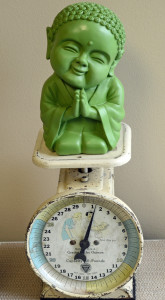Every December, I start to think about intentions for the coming year. Not as once-a-year resolution making but as part of an ongoing process of self-reflection and re-commitment to what is true for me.
Lately, I find myself meditating often on a theme that’s central to my roles as both father and pediatrician: what essential truths must we teach our children?
For me, as I suspect for you, this is and will remain a work in progress. Coming to grips with the reality that — surprise! I’m human too! — has served to deepen (rather than undermine, as I feared) my connection with my patients and their parents.
As we practice together, I welcome your comments and additions to the list.
1. Have the courage to fail.
Both purposefully and inadvertently, we are giving our kids the message that perfection is the goal. So many kids I see are struggling with measuring up to “ideal” that they become increasingly anxious and depressed, giving up prematurely on dreams and withdrawing from friends and family.
The greatest inventors of our time all have one thing in common — they failed, many times, until finding their way. It takes a lot of courage to fail, admit it, and get back up again. Honoring this process is crucial and does not contradict having goals. In fact, I’d argue both are keys to developing self-worth.
2. Nurture your creativity.
When we are young, much of our time is spent freely creating — art, music, dance — anything involving imagination. Creating is simply the act of making something that was not there before. It’s all about freedom of expression. Yet somehow as they grow, our kids learn that things have to look “right.”
No! Musician Peter Himmelman, the most spontaneously creative human I know, offers, “A kid’s greatest asset is a sense of wonder. The freedom to fearlessly explore the world is the bedrock of human creativity.” It is this fearless exploration that I believe will lead us to out-of-the-box solutions to our greatest 21st century challenges.
3. You have much more in common with your fellow humans than not.
Scientists currently estimate we share about 99% of DNA with each other. We have so much in common with our fellow earth-dwellers despite our apparent outward differences. Too often, these differences — racial, ethnic, religious, cultural, generational — are used to justify horrific acts of prejudice and aggression.
If you watch young children at play, you see how easy it is for diverse people to get along without judgment. What is profoundly sad is that we train this tolerance out of our children. This must stop! Think how much more peaceful a world we would live in if we honored our shared dreams, visions and desires.
4. Embrace your differences.
Though we are far more the same than different, it is also important to celebrate the things that make us unique. While not an excuse to exclude or judge others, we can acknowledge we all have special gifts and challenges. For example, we all learn differently. Anyone who spends enough time with babies realizes that they display noticeable variation in motor skills, language development and social play. Yes, some children have extreme challenges requiring specialized support and educational assistance. But much of what we diagnose today as a “disorder” is in fact well within the bell-shaped curve of “typical.” These variations need not be “treated” but respected and nurtured.
5. We are the Earth, and the Earth is us.
Native Americans have taught me a crucial ecological belief, one I’ve tried to impart to my children and my patients. The well being of every living entity is absolutely interconnected. How we treat the earth and our fellow creatures has a direct impact on our health. The most recent example? Pregnant women exposed to high levels of air pollution are more likely to give birth to children ultimately diagnosed with autism. Global climate change is real, it’s here, and it’s going to cause universal harm – unless we act now.
6. When left alone, we usually heal ourselves.
One of the most powerful lessons I teach my patients is that our bodies have such innate powers, such wisdom, that they spontaneously recover from most common ills. Colds, coughs, sore throats, and fevers do not usually require heavy-duty medications to resolve, and many of these treatments offer more potential for harm than good.
I often point out during office visits how well minor scrapes or cuts are healing, and kids are amazed that their little bodies have done that all by themselves. A tincture of time is an extremely powerful prescription.
7. You can’t get rid of all the stress in the world but you can learn how to better cope with it.
There are days I wish I could wave a magic wand and evaporate the stressors plaguing my patients (and my kids). Yet I’ve learned that, one, I can’t, and two, nurturing equanimity in the face of challenges is one of the greatest gifts we can bestow on our children. We must teach them more effective ways, like yoga and meditation, to cope with what inevitably will come their way.
(Originally written for MindBodyGreen)

Leave a Reply
You must be logged in to post a comment.